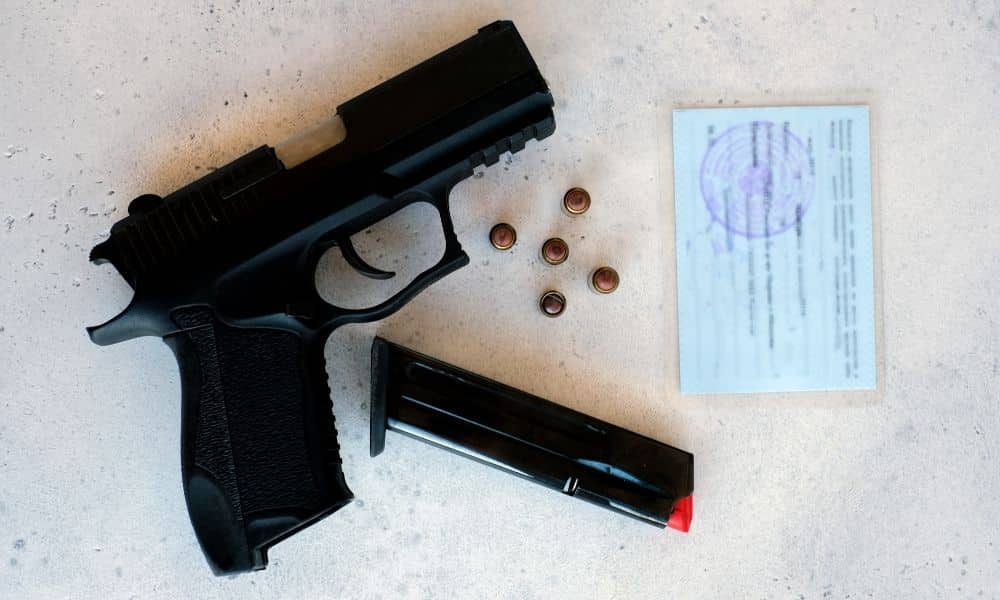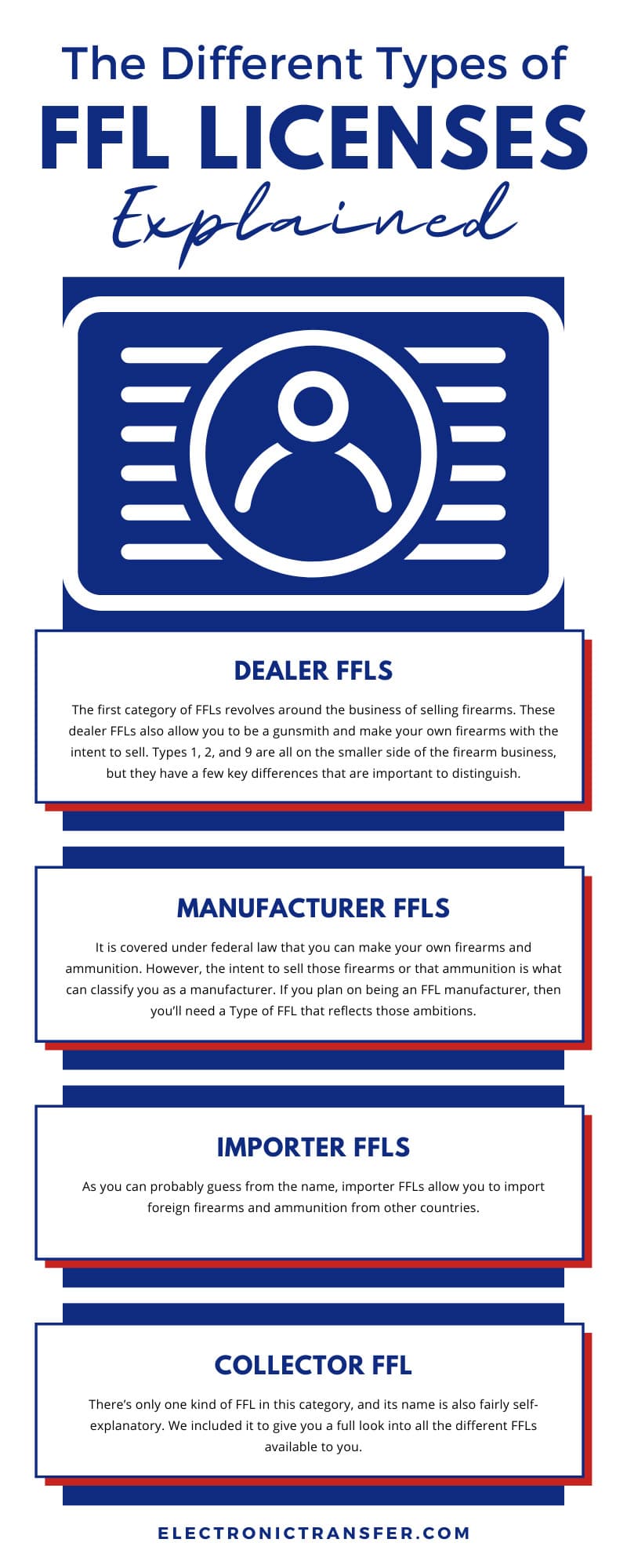The Different Types of FFL Licenses Explained
Paul Baptist | Posted on |


The business of buying and selling firearms can be a complicated one, and understandably so. With safety being such a high priority in all cases when it comes to dealing in firearms, it makes sense that there are plenty of regulations to ensure that the right people have the ability to deal in the correct kind of firearms. If you plan on working with firearms in any sort of business setting, you’ll need an FFL. However, any FFL won’t do since they all cover different things relating to the purchase and sale of firearms.
In this article, we’ll explain the different types of FFL licenses so you can get a better idea about which one will work for your business. Remember that the size and scope of your business, as well as your plans for future expansion, will play a key factor in determining which FFL you need to operate legally. After you read this, you shouldn’t have any trouble getting the right FFL and setting up your credit card processing capabilities for your business.
FFL Definition
FFL stands for Federal Firearms License, a kind of license that a business needs in order to be able to buy, sell, or trade firearms legally. There are a number of different FFLs depending on the size and scope of the business. For example, selling firearms in a store requires a different FFL type than the one you would need in order to manufacture your own firearms for distribution. You can’t receive an FFL without understanding all the safety protocols and procedures that go along with these buying and selling these kinds of sensitive products. Having the right FFL means you know what you’re doing, you’re doing it within the bounds of the law, and that you have credibility with customers.
The key part of an FFL is that you must be “engaged in the business of” buying, selling, creating, or importing firearms. Selling firearms that you own legally on your own doesn’t require an FFL. However, if you have any “intent to sell” a firearm after buying it or creating it yourself, you’ll need an FFL to do so legally.
Dealer FFLs
The first category of FFLs revolves around the business of selling firearms. These dealer FFLs also allow you to be a gunsmith and make your own firearms with the intent to sell. Types 1, 2, and 9 are all on the smaller side of the firearm business, but they have a few key differences that are important to distinguish.
Type 1 FFL
Far and away the most common FFL out there is the Type 1 FFL. Explaining the different types of FFLs wouldn’t be possible without first understanding a Type 1 FFL. A Type 1 FFL is the most basic version of the license you can get and allows the holder to buy and sell firearms specifically for business purposes. Many home-based FFLs and your average firearm stores have a Type 1 FFL that allows them to operate normally while buying and selling firearms.
Type 2 FFL
There’s only really one big difference between a Type 1 and a Type 2 FFL. The key difference is that Type 2 FFLs allow you to conduct the activities of a firearm pawnbroker. There’s a good reason for this distinction. Pawnbroker activities mean that some of the firearms won’t actually be the property of the business itself. Firearms that have been pawned are more likely to be firearms that were obtained or illegally operated in the past.
Type 9 FFL
Type 9 FFLs also have a clear distinction that you need to know before you get one. You will need a Type 9 FFL if you want to deal in firearms, but specifically if you want to buy and sell Destructive Devices. The definition of Destructive Devices can be complicated, but it generally refers to anything that can do more damage than a typical firearm. It also could refer to parts that one could use to assemble a Destructive Device.
Manufacturer FFLs
It is covered under federal law that you can make your own firearms and ammunition. However, the intent to sell those firearms or that ammunition is what can classify you as a manufacturer. If you plan on being an FFL manufacturer, then you’ll need a Type of FFL that reflects those ambitions.
Type 6 FFL
Having a Type 6 FFL officially allows you to manufacture ammunition as a business with the intent on selling it. It does not allow you to manufacture firearms with the intent to sell. It’s important to remember that you can make your own ammunition, but intending to sell it later means you need either a Type 6 or 7 FFL.
Type 7 FFL
The second most common FFL it a Type 7, and it allows you to manufacture firearms and ammunition both with the intent to sell them as a business. You’ll also need to make sure that any firearms you produce are marked correctly according to the United States ATF.
Type 10 FFL
Just like with the Type 9 FFL for dealers, the only real difference in the Type 10 FFL is that it allows you to manufacture Destructive Devices for sale as a business. Type 10 FFLs allow you to create firearms and Destructive Devices, whereas a Type 9 only lets you buy and sell them.
Importer FFLs
As you can probably guess from the name, importer FFLs allow you to import foreign firearms and ammunition from other countries.
Type 8 FFL
Type 8 FFLs give your business the ability to import foreign arms that you intend to sell. Just like with the Type 7 FFL, you still need to mark these firearms in accordance with the United States ATF’s standards. They don’t get a pass just because they are from another country.
Type 11 FFL
This is the FFL to get if you want to import firearms from other countries, as well as import Destructive Devices from other countries. Be aware of what constitutes a foreign Destructive Device before you try to import one.
Collector FFL
There’s only one kind of FFL in this category, and its name is also fairly self-explanatory. We included it to give you a full look into all the different FFLs available to you.
Type 3 FFL
A Type 3 FFL is only for collectors of curios and relics related to firearms. This FFL doesn’t allow you to engage in business activities related to firearms or ammunition. With this FFL, you can collect old and antique firearms without any extra effort.
Now that you have a better idea about the kind of FFL you might need, don’t forget to set up your business’ FFL credit card processing. Electronic Transfer can help get your credit card processing ready to go as soon as you open up shop.



